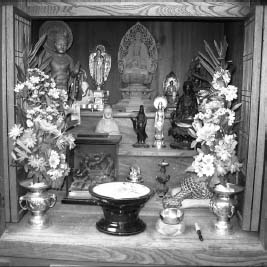BuddhismCustoms and Rituals |
What rites do Buddhists practice in the temple? |
Some of the ordinary ritual activity that occurs in most Buddhist temples is communal. Congregational chanting of mantras or singing of hymns occasionally plays an important role. But a great deal of Buddhist temple ritual remains relatively unscheduled and highly individualized. Worshippers in Theravada temples sit or bow before the Buddha image and recite traditional prayers in praise of the historical Buddha. Devotees often hold as an offering a candle, flower, food, or a small parasol, symbols of respect for royalty. Offerings of flowers are particularly helpful reminders of impermanence, since they invariably wither and fade. Worshippers generally regard sacred images as aids to prayer and often also as possessing certain magical powers, but the image is not itself the Buddha. Theravada ritual aims to overcome the suffering born of inappropriate craving. Some temples have wall murals depicting scenes from the Jataka tales, each one exemplifying one essential virtue. Worshippers can meditate on these scenes in succession and ponder the ethical implications. Since the Buddha was like an extinct fire that needs no more fuel, people do not worship him as such. Theravada temple ritual is meant to dispose the devotee for greater spiritual development. Popular Mahayana rituals are similar in some outward respects, but they focus on the Buddha and Bodhisattvas as repositories of saving grace and power. Worship is a means to assure rebirth in one of the Buddha-lands. Rituals emphasize the need to surrender entirely to saving grace and boundless compassion. Ritual helps overcome ignorance of the ultimate sources of transforming spiritual power. Mahayana temples often display multiple images, sometimes having several walls lined with statues. Devotees can pay their respects to each, waving an incense wand clasped between folded hands as a gesture of veneration.

A small Buddhist house-sized shrine. Kyoto, Japan. (Photo courtesy of David Oughton.)
